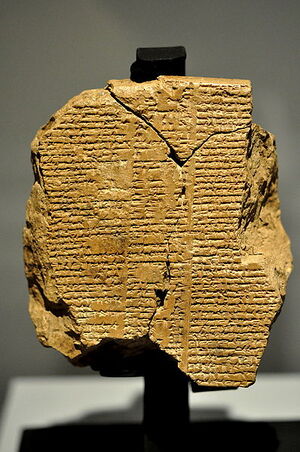Literature (nonfiction): Difference between revisions
No edit summary |
No edit summary |
||
| (4 intermediate revisions by the same user not shown) | |||
| Line 1: | Line 1: | ||
[[File:Epic_of_Gligamesh_tablet_V.jpg|thumb|Tablet V of the Epic of Gilgamesh. The tablet dates back to the old Babylonian period, 2003-1595 BCE. From Mesopotamia, Iraq. The Sulaymaniyah Museum, Iraq.]]'''Literature''', in its broadest sense, consists of any | [[File:Epic_of_Gligamesh_tablet_V.jpg|thumb|Tablet V of the Epic of Gilgamesh. The tablet dates back to the old Babylonian period, 2003-1595 BCE. From Mesopotamia, Iraq. The Sulaymaniyah Museum, Iraq.]]'''Literature''', in its broadest sense, consists of any written productions. | ||
More restrictively, it refers to those deemed to have artistic or intellectual value, or which deploy language in ways that differ from ordinary usage. | More restrictively, it refers to those deemed to have artistic or intellectual value, or which deploy language in ways that differ from ordinary usage. | ||
| Line 5: | Line 5: | ||
Its Latin root ''literatura/litteratura'' (derived itself from ''littera'': letter or handwriting) was used to refer to all written accounts, though contemporary definitions extend the term to include texts that are spoken or sung (oral literature). | Its Latin root ''literatura/litteratura'' (derived itself from ''littera'': letter or handwriting) was used to refer to all written accounts, though contemporary definitions extend the term to include texts that are spoken or sung (oral literature). | ||
Literature can be classified according to whether it is [[fiction (nonfiction)]] or [[non-fiction (nonfiction)]] and whether it is poetry or prose; it can be further distinguished according to major forms such as the novel | Literature can be classified according to whether it is [[fiction (nonfiction)]] or [[non-fiction (nonfiction)]] and whether it is poetry or prose; it can be further distinguished according to major forms such as the novel, short story, or drama; and works are often categorized according to historical periods or their adherence to certain aesthetic features or expectations (genre). | ||
The concept has changed meaning over time. | The concept has changed meaning over time. | ||
| Line 13: | Line 13: | ||
Developments in print technology have allowed an evergrowing distribution and proliferation of written works, culminating in electronic literature. | Developments in print technology have allowed an evergrowing distribution and proliferation of written works, culminating in electronic literature. | ||
== | == In the News == | ||
<gallery mode="traditional"> | <gallery mode="traditional"> | ||
File:Cherenkov-radiation Advanced-Test-Reactor.jpg|link=High-energy literature|Cherenkov radiation is commonly used to advance the plot in [[high-energy literature]]. | File:Cherenkov-radiation Advanced-Test-Reactor.jpg|link=High-energy literature|Cherenkov radiation is commonly used to advance the plot in [[high-energy literature]]. | ||
</gallery> | </gallery> | ||
== Fiction cross-reference == | |||
* [[High-energy literature]] | * [[High-energy literature]] | ||
| Line 23: | Line 25: | ||
== Nonfiction cross-reference == | == Nonfiction cross-reference == | ||
* [[Fiction (nonfiction)]] | |||
* [[Illeism (nonfiction)]] | * [[Illeism (nonfiction)]] | ||
* [[ | * [[Non-fiction (nonfiction)]] | ||
* [[Satire (nonfiction)]] | |||
External links: | |||
* [https://en.wikipedia.org/wiki/Literature Literature] @ Wikipedia | * [https://en.wikipedia.org/wiki/Literature Literature] @ Wikipedia | ||
* [https://en.wikipedia.org/wiki/History_of_literature History of literature] @ Wikipedia | * [https://en.wikipedia.org/wiki/History_of_literature History of literature] @ Wikipedia | ||
Latest revision as of 08:28, 16 September 2018
Literature, in its broadest sense, consists of any written productions.
More restrictively, it refers to those deemed to have artistic or intellectual value, or which deploy language in ways that differ from ordinary usage.
Its Latin root literatura/litteratura (derived itself from littera: letter or handwriting) was used to refer to all written accounts, though contemporary definitions extend the term to include texts that are spoken or sung (oral literature).
Literature can be classified according to whether it is fiction (nonfiction) or non-fiction (nonfiction) and whether it is poetry or prose; it can be further distinguished according to major forms such as the novel, short story, or drama; and works are often categorized according to historical periods or their adherence to certain aesthetic features or expectations (genre).
The concept has changed meaning over time.
Nowadays it can broaden to include non-written verbal art forms, and thus it is difficult to agree on its origin, which can be paired with that of language or writing itself.
Developments in print technology have allowed an evergrowing distribution and proliferation of written works, culminating in electronic literature.
In the News
Cherenkov radiation is commonly used to advance the plot in high-energy literature.
Fiction cross-reference
Nonfiction cross-reference
External links:
- Literature @ Wikipedia
- History of literature @ Wikipedia

